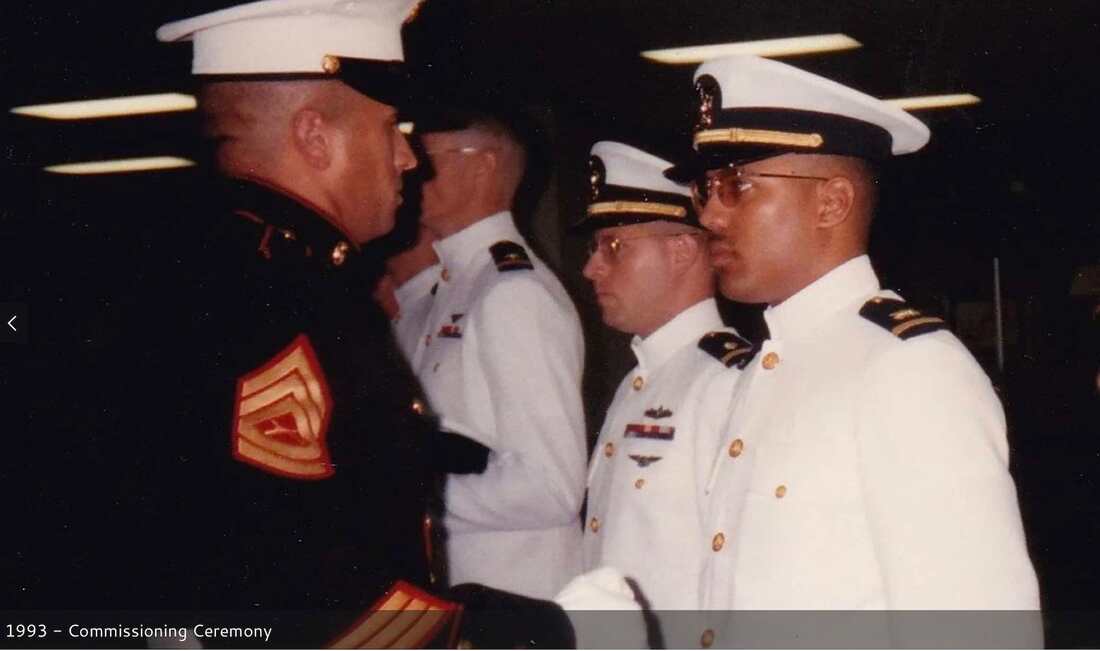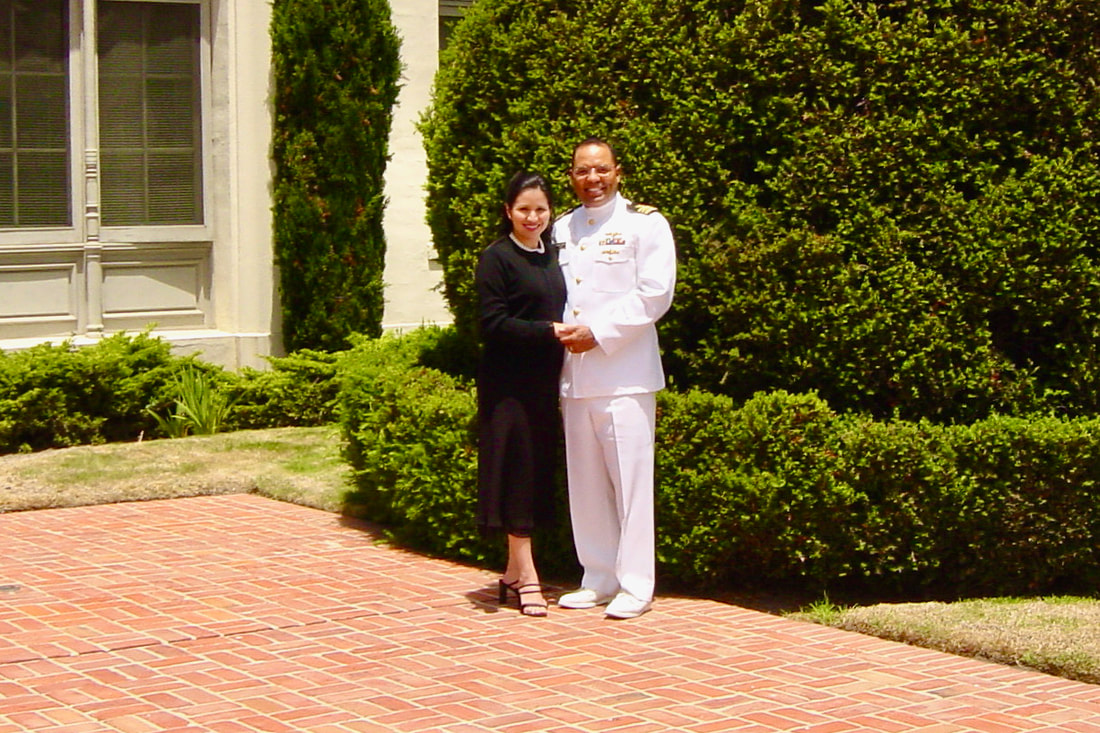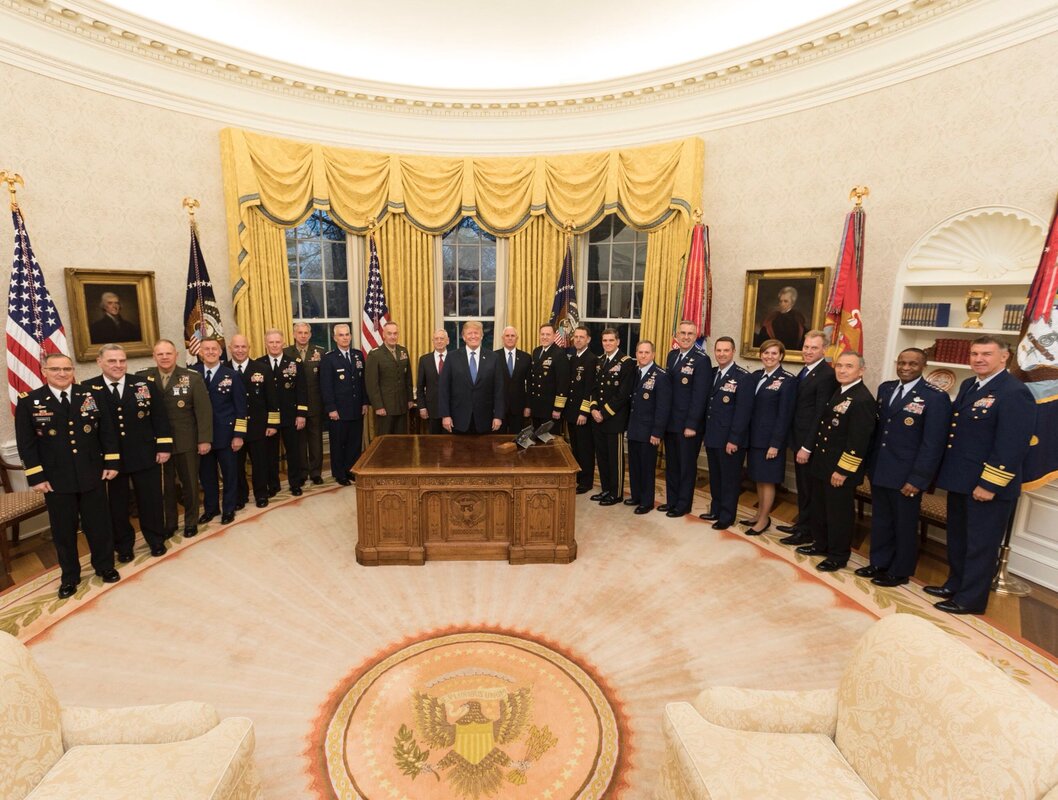|
Bad men need nothing more to compass their ends,
than that good men should look on and do nothing. ( John Stuart Mill )
I enlisted in the military in 1986, and, as the picture above reflects, I was commissioned as an officer in the United States Navy in 1993.
I retired at the rank of commander two years ago. During that 30-year timeframe, our nation's Navy has changed significantly. However, as I pointed out in a recent blog post, "Our Navy - your Navy - continues to lose incredibly talented leaders, primarily because those same talented leaders do not fit the mean, median, mode, or, most importantly, the mold.” After I shared that blog post “How I Helped Slow Systemic Racism in Our Nation’s Navy,” the response was immediate and unprecedented. Through my website and across the various groups to which I belong on LinkedIn and Facebook, many people reached out to say “Thank you.” They thanked me for having the “courage” to publish an essay about the current state of our nation's Navy, and military, in general. I received thank-you notes from Active Duty personnel, Reservists, and Retired personnel... as well as civilians who have never served in our nation's military. Perhaps the most heartfelt response was from a mother of a service member. Without revealing her identity, I will simply convey what she said in her email:
“As a mom of someone who graduated from the USNA and the Post Grad schools,
I find your comments to be spot on. I just wanted to thank you for your courage and honesty.”
I find it terribly ironic that, the more candid and transparent I am, the more I am seen as “courageous” and “honest.” These heartfelt messages imply that a negative backlash and a war with senior Navy leaders is awaiting me somewhere, somehow, some day... for simply being authentic and sharing a (Capital-T) Truth that is hidden in plain sight.
But to be perfectly candid, I was not totally honest in my previous post regarding my exchanges with the Naval Postgraduate School Alumni Association and the President of the Naval Postgraduate School. Though I did, in fact, allude to my disappointment with the “unsupportive response from the President of the Naval Postgraduate School and the underwhelming support of senior ‘leadership’ at the National Naval Officers Association...” ...to be honest, I didn’t share the reasons why I was disappointed. Indeed, there were several reasons. And, though I am a self-proclaimed "optimistic realist," I feel compelled to share two primarily idealistic (as opposed to optimistic) reasons why I believe the leadership of these two organizations failed spectacularly in their respective roles. POINT #1. In the week following my request for a Zoom meeting with the leadership of the Naval Postgraduate School and the NPS Alumni Association, the president of the Naval Postgraduate School held an “open dialogue” about racial diversity. (click on the link to read it... or listen to to it). On its face, the “open dialogue” facilitated by the school’s president appeared to be an honest attempt at initiating resolution of the challenge of racial politics in America. However, in the REAL WORLD, the school’s president laid blame and the responsibility to search for a solution at the lap of four Black officers, all of whom were several ranks junior to the retired three-star admiral. Consider the words of the NPS president, the retired admiral:
“I brought together four of our outstanding students to talk about this historically difficult topic with greater urgency and determination, one that must be a topic for all leaders … inclusion, diversity and the issue of race that has been at the center of our nation's pain and anger,” said the president.
“I wanted to listen and explore with them how we in the military, and how we as leaders, can do more to understand concerns they have and discuss ideas together to make real change.” (NPS president ~ see video below)
Here's where the words of the school's president and the REAL WORLD are in conflict:
If inclusion, diversity and the issue of race are topics “for all leaders,” then the president should have included a more diverse panel of naval officers. To be more precise: the president asked four Black naval officers to help solve a problem by which they, themselves, did not cause, but are potentially, if not likely, directly and adversely affected. To be even MORE precise: the president of the Naval Postgraduate School purposefully left White naval officers out of the discussion.
Why?
Wouldn’t it be nice to hear what THEY have to say?
In fact, why not have a subsequent “Open Dialogue About Racial Diversity” with an all-white caste of junior and field-grade officers? (And, yes: I meant to spell caste in the manner it is spelled).
After all, the school’s alumni association appears to be exceedingly comfortable with an all-white Advisory Council (until my attempts at forced integration) and an all-white Board of Trustees (which remains all-white as of the date of this post). Please seek to understand my perfectly authentic point here... Ask yourself... are Black people the problem here? Of course, the answer is "No." However, here, again, these Black naval officers - FOUR BLACK MEN - were being asked for insight into the problem. But here's the thing: our nation - your nation - does not have a history of enslavement, lynchings, victim-blaming, and the well-documented disenfranchisement and ostracism of White men. To be perfectly transparent, honest, and (dare I say it) courageous: our nation - your nation - has a history of enslavement, lynchings, victim-blaming, and the well-documented disenfranchisement and ostracism of Black men. Some of my friends and fellow naval officers still on Active Duty ask me why I, the optimistic realist, have decided to write on this potentially divisive topic (?) Indeed, it takes significantly more effort and extra work to be fully invested in who we are and the associated things we have to say, than to perform according to the muted expectations, false frameworks, and unsubstantiated directives of others. And as I stated in my previous post, for many people, this public investigation of the perspectives of the Black naval officers would likely be an oversight. But for me, it was a formidable slight to which there could be no excuse. In the final remarks of the "dialogue," the president of NPS says, "You have my commitment in making sure NPS is a place that solves problems.” I remain unimpressed. And here's why... In the context of the conversation, the Naval Postgraduate School could be a place that solves racial problems, if nowhere else, within our military... and (perhaps) within our society. Yet... In today’s world, it is absolutely unacceptable for a retired three-star admiral to ONLY “invite” four black military officers to speak openly about something that can absolutely affect the trajectory of their career… Aside from asking these young Black men to lay bare their personal and professional souls, the power dynamic between them and the retired three-star admiral is wildly askew.
In reality, the Black naval officers were likely very circumspect.
In fact (play the video)...
My simple point is this: I wonder how White naval officers at the Naval Postgraduate School feel about inclusion, diversity and the issue of race in our nation’s Navy.
Wouldn’t it be nice to hear what THEY have to say?
Apparently, the president of the NPS didn't think they were part of the solution or the problem.
POINT #2. In the week following my Zoom meeting with the leadership of the Naval Postgraduate School and the NPS Alumni Association, I suggested that the Naval Postgraduate School and its Alumni Association could be - SHOULD BE - at the forefront of initiating creative, bold, and authentic solutions to the military’s conundrum of race, racial politics, and the resultant abysmal level of diversity reflected at the highest levels of our nation’s civilian and uniformed military leaders (as reflected in the below photograph which shows our nation's top uniformed military leaders posing with the Commander-in-Chief of the Armed Forces).
The Memorandum of Agreement between the Naval Postgraduate School and the Alumni Association of the Naval Postgraduate School delineates very specific roles and responsibilities of the Alumni Association, one of which is to “serve as the primary point of contact between the Naval Postgraduate School and the Foundation on all matters relating to the relationship.”
And, in this regard, the Naval Postgraduate School and the Alumni Association are inextricably bound. Accordingly, in at least three separate Zoom meetings, I specifically asked the president of the Alumni Association to convey POINT #1 and POINT # 2 as described above. As one of the premier institutions of higher learning for our nation's military leaders, the Naval Postgraduate School could actually provide a platform for proactively seeking, researching, and (dare I say it) literally learning about the Navy’s apparently inherent challenges of inclusion, diversity and the historical savagery and VERY contemporary politics of race. Accordingly, I offered several suggestions on HOW the Naval Postgraduate School could effectuate such research and learning.
I suggested quarterly seminars for students at NPS.
I suggested brown-bag luncheons at NPS. I suggested, rather idealistically... ...a course on race relations within our Navy, and within the military, in general. The reaction, response, and reply from NPS: ~ SILENCE ~ Let’s all try to remember the absolute power of silence.
In fact, let’s remember who was “invited” to speak at the “open dialogue…”
…and who was allowed to remain silent. ~ ~ ~
AUTHOR'S NOTE: As difficult as conversations like these may appear to be, it's often more difficult to write about them. Yet, we must continue to press forward in an authentic investigation of self if we are to become a "more perfect union."
In retrospect, I remember being brought to tears when it became evident that President-elect Obama was on the verge of making history. At the time, I was leading a men's group of Christian men while living in the D.C Metropolitan Area. Interestingly enough, I was the only person of color in the group, And I vividly remember the clear disappointment among at least one member of the group when we discussed President-elect Obama. To be honest, as the years went by, I became somewhat disenchanted with the manner in which President Obama seemed to handle race relations. In my limited view of things, it seemed as though he only spoke publicly about race when the nation was grappling with a severe "racial incident." And, unfortunately, there were numerous "racial incidents" during the Obama Presidency, including the incident when Harvard professor Henry Louis Gates Jr was arrested on suspicion of breaking into his own home near Harvard. Equally notorious was the incident when George Zimmerman killed Trayvon Martin. President Obama spoke publicly on both occasions. And, in my opinion, he spoke authentically. First in 2009, in his answer to a reporter's question regarding the arrest of Professor Gates, President Obama admitted his feelings and associated response were a little bit biased, primarily because Professor Gates is a personal friend of the Obamas. Secondly, when Zimmerman killed the teenager, President Obama said "If I had a son, he would look like Trayvon." This statement, though entirely rooted in fact, incensed so many Americans. Accordingly, many Americans wasted very little time as they pounced and accused him of race-baiting. Indeed, whenever the topic of race was at hand, President Obama found himself in the proverbial Catch-22; a no-win situation... despite being imminently qualified to speak authoritatively on the subject. I adore President Obama. I just wish he would have spent more time discussing race and racial politics in relatively "normal" times. For example, perhaps a better time to discuss race would have been on some random Tuesday morning when racial tensions were not so inflamed.
However, in this country...
...we are always a few hours away from a race-related incident.
John H. Clark III is an optimistic realist.
Principal consultant at The PIE Group, and Executive Director of TeenBuilding USA, [a non-profit 501c(3)], John H. Clark III believes better development of leaders is what we (all) need. And to be better organizations, we need more good leaders, not followers. To build better leaders, we must start with the individual (you, she, he, and me).
Described as “an innovative leader,” John teaches leaders, organizations, and individuals how to inspire each other. With a bold goal to inspire a worldwide community of optimistic realists who continuously accept, adapt to, and achieve the bold and beautiful concept of The Ideal Life, John is leading a movement to inspire people to apply his trademarked mantra {Accept. Adapt. Achieve! ®}. An innovative business manager and retired naval officer, John is fascinated by leaders and organizations that make the greatest impact within their organizational culture and within the “real” world — people who “get it.” Over the course of his life as a military leader, corporate mentor, and innovative content creator, John has discovered a wealth of insight about how we think, act and communicate within our respective work/life environments. As a career naval officer, mentor, educator, and optimistic realist, he has devoted his life to sharing insights to assist in our quests to become better at what we all do – live @ work! An optimist with a penchant for writing about realistic solutions to the challenges of everyday life, John is the author of 3 books: a leadership-development insider, The Ideal: Your guide to An Ideal Life, a teen-focused guide, Getting Out: Expert Advice for Today’s Teens, and the Christian-based book, God’s Heartbeat: A Powerful Premise for Leading a Christian Life. He delivers a unique and refreshing point of view to life's seemingly overwhelming situations. Through books, blogs, and everyday conversation, John's message resonates with an empowering blend of ideals that enrich, uplift, and authorize people to set and achieve goals far beyond current mindsets. An engaged community advocate and authentic leader, his trademarked phrase is a winner: |
My purposeInspiring a worldwide community of optimistic realists. Archives
April 2024
Categories |





 RSS Feed
RSS Feed
